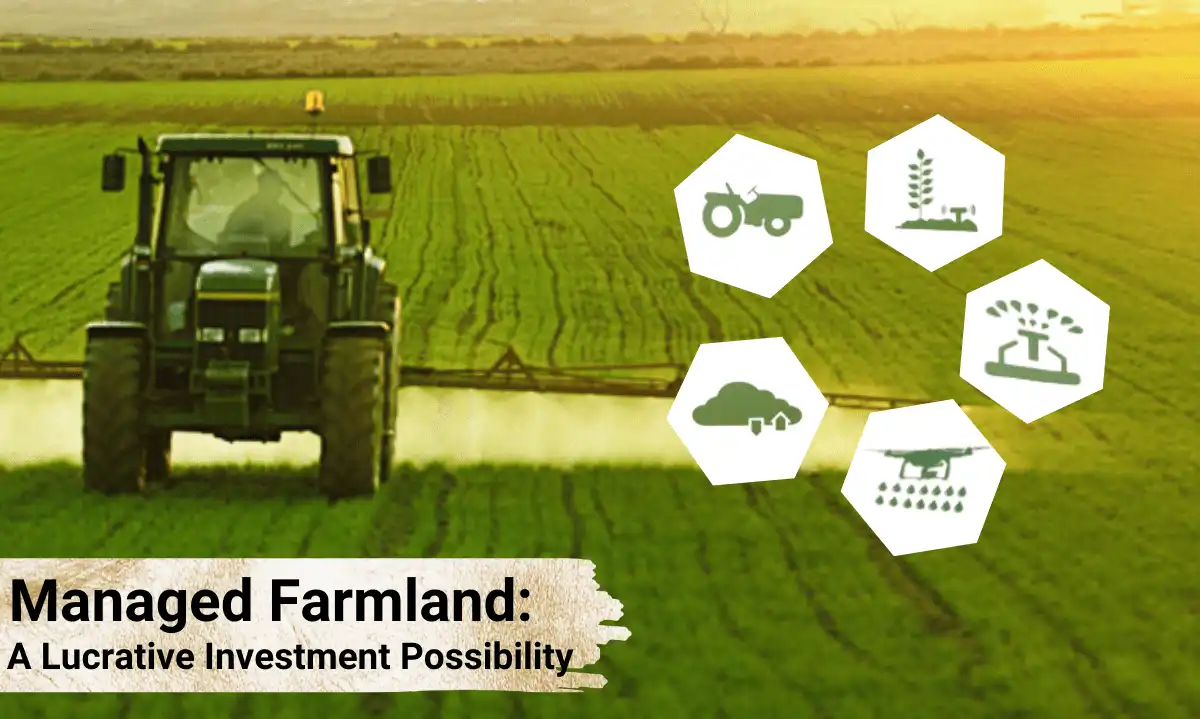Managed Farmland: A Lucrative Investment Possibility

Managed farmland has become a potential and thriving investment prospect as investors look to diversify their portfolios and investigate different asset types. Simply said, farmland is agricultural land that is utilized for farming, cultivation, and other agricultural pursuits. Managed farmland expands on this idea by providing expert management and guidance to maximize possible returns on investment.
Understanding Managed Farmland and its Investment:
Managed farmland refers to agricultural land that is professionally operated and supervised by experienced agricultural companies or experts. The concept involves investors purchasing farmland and then entrusting its day-to-day management to these specialized firms. The goal is to maximize the land's productivity and financial returns while minimizing operational risks.
In a managed farmland setup, investors typically have the option to either lease the land to agricultural companies or partner with them on a revenue-sharing basis. The chosen management team takes charge of various agricultural activities, including crop selection, planting, irrigation, fertilization, pest control, harvesting, and marketing.
Managed farmland investments involve individuals or entities purchasing agricultural land and entrusting its management to experienced agricultural companies or professionals. These experts handle all aspects of farming, including crop selection, irrigation, pest control, and harvesting, to optimize productivity and revenue. Investors can either lease their farmland to these experts or partner with them on a revenue-sharing basis.
Investment Strategies for Managed Farmland:
Direct Ownership: Investors have the option of directly acquiring farmland and hiring agricultural management firms to look after it. This provides more direct control and the chance for greater profits. Real Estate Investment Trusts: Some real estate investment trusts (REITs) have agricultural asset specializations, including managed farmland. Investing through a REIT offers advantages in terms of liquidity and diversification. Crowdfunding Platforms: Through the use of online platforms, people can pool their money and purchase managed farmland. This choice provides broader access to this asset class and reduced entry hurdles.Benefits of Investing in Managed Farmland:
Stable Income Stream: Managed farmland investments often generate consistent income through crop yields or leasing arrangements. Agricultural commodities like food and fiber remain in demand, providing a reliable income source. Inflation Hedge: Farmland investments historically act as a hedge against inflation, as the value of crops and land tends to rise with inflationary pressures. Diversification: Managed farmland offers diversification benefits, as its performance is not closely correlated with traditional financial markets like stocks and bonds. Sustainable and Impactful: Investing in agriculture contributes to sustainable practices, supporting food security and responsible land management.Factors to Consider When Investing in Managed Farmland:
Location and Soil Quality: The location and soil quality of the farmland play a crucial role in determining its productivity. Well-irrigated and fertile land in regions with favorable climates tends to yield better returns. Crop Selection: The choice of crops grown on the farmland impacts both the income potential and the environmental sustainability of the investment. Diversifying crops can reduce risks associated with market fluctuations. Expert Management: Partnering with reputable agricultural management companies is essential to ensure efficient operations and optimal crop yield. Their expertise can lead to increased profitability and better risk management. Legal and Regulatory Compliance: Understanding local regulations, land rights, and permits is vital when investing in managed farmland. Complying with legal requirements mitigates potential legal and financial risks. Market Demand and Trends: Assessing the current and future demand for agricultural products can help investors make informed decisions about crop selection and pricing strategies.Challenges and Risks of Managed Farmland Investment:
While investing in managed farmland offers numerous benefits, there are also challenges and risks to consider:
Weather and Climate Risks: Agricultural investments are vulnerable to weather-related events like droughts, floods, and extreme temperatures, which can significantly impact crop yields and revenues. Market Volatility: The prices of agricultural commodities are subject to market fluctuations influenced by factors like global supply and demand, trade policies, and geopolitical events. Environmental and Regulatory Risks: Changing environmental regulations and compliance requirements may affect farming practices and operational costs. Operational Risks: Crop diseases, pests, and management issues can affect the productivity and profitability of farmland. Liquidity: Unlike traditional assets like stocks and bonds, farmland may have lower liquidity, making it challenging to quickly convert the investment into cash.The Potential Return on Investment (ROI) from Managed Farmland:
Returns on managed farmland investments vary based on factors like location, crop selection, and management expertise. In many cases, investors can expect returns in the range of 5% to 10% annually. While these returns might appear modest compared to high-risk investments, managed farmland's stability and potential for long-term growth make it an attractive addition to an investment portfolio.
The Long-Term Investment Perspective:
Managed farmland investments are well-suited for investors with a long-term perspective. Unlike short-term investments with higher volatility, farmland provides stable and reliable returns over time. As global populations continue to grow, the demand for food and agricultural products is expected to rise, driving the need for productive farmland. This long-term demand factor positions managed farmland as an investment opportunity with the potential for sustained growth and stability.
To conclude, managed farmland presents an attractive investment avenue for those seeking stable returns, portfolio diversification, and an opportunity to contribute to sustainable agricultural practices. By leveraging the expertise of agricultural professionals, investors can enjoy the benefits of farmland ownership without the complexities of active farming. As with any investment, conducting thorough research and seeking advice from financial experts is essential to make informed decisions in this flourishing sector.
Investing in managed farmland not only provides the potential for financial gains but also contributes to the global need for sustainable food production. As the world population continues to grow, the importance of productive and well-managed farmland will only increase, making it a thriving investment opportunity with a promising future.
Latest Blog
JOIN OUR COMMUNITY !
Stay connected with Getfarms! Follow us on social media for the latest updates, exclusive offers, and a glimpse into the world of farmhouse living. Join our community today




























